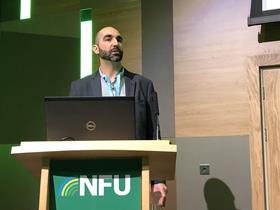
Attracting enough seasonal labour remains a huge challenge for UK growers but there is no shortage of non-EU workers ready to come and pick in the UK, major recruitment firm Concordia has said.
The company, which is one of two firms operating a pilot seasonal workers scheme for the government, has been inundated with calls and emails from Eastern Europe, India and Bangladesh since the scheme was announced in September last year.
For the time being, Ukraine, Moldova and Russia are the three countries that Concordia is recruiting workers from under the trial scheme.
“I receive phone calls on a daily basis from agents representing thousands of workers saying: 'when can they come over, when can they come over?'” Concordia’s operations and development manager Sam Zubaidi told growers at the NFU Conference in Birmingham yesterday (20 February). “I certainly think that from those countries there’s going to be absolutely no shortage of supply.”
He added: “The day after we announced we were going to be operating the pilot scheme, we had 300 emails in our inbox from India and Bangladesh, and I’m currently still receiving 20-30 calls a day from those countries.”
With labour shortages intensifying after the EU referendum, largely due to the devaluation of the pound, the soft fruit and topfruit sectors in particular have been lobbying urgently for the introduction of a seasonal workers scheme.
The number of EU workers coming to pick fresh produce in the UK has generally been declining, and in September 2017 and August 2018, shortages of seasonal workers hit almost 30 per cent, according to NFU figures.
'The level of interest that has been expressed outside the EU is really important because when we leave the EU we will be looking for a scheme that enables us to recruit from outside the EU,' said the NFU's chief adviser for horticulture and potatoes, Lee Abbey.
'We already know that workers coming from the EU are reducing, and most countries across the EU already have some kind of seasonal workers scheme in place to allow them to get workers from outside the EU itself, so it’s really important that the pilot scheme is demonstrated to be effective and that there’s interest.
'Early signs are really good and it just helps reinforce the need for a future scheme which is effectively for anyone from outside the UK.'
It is widely accepted that the 2,500 non-EU workers that will be allowed to enter the UK for up to six months over the next two years will not be sufficient to meet the shortfall in labour supply, which the NFU estimates at 8,000-10,000.
To meet the industry’s needs, the NFU has been calling on government to increase the number of permits issued to 10,000. But for the time being, Concordia and Proforce, the other recruiter running the scheme, have been limited to providing just 1,250 workers each.
While Concordia doesn’t have this number of workers on its books yet, it says its agents in Eastern Europe have conducted preliminary interviews with candidates.
Zubaidi explained that workers have been allocated to companies in parts of the UK and in crops with the greatest demand for labour. The largest number of permits granted by Concordia are for farms in Scotland, followed by Evesham, Kent, Staffordshire and Lincolnshire.
More than three quarters of permits have been set aside for soft fruit and topfruit growers, with the remainder going to vegetable producers.
Zubaidi explained that the pilot scheme would operate in the following way:
1. Concordia and Proforce’s agents in Eastern Europe shortlist, interview and put forward candidates – once they have obtained their licence from the Gangmasters & Labour Abuse Authority (GLAA).
2. If the workers meet the job criteria, Concordia issues Certificates of Sponsorship to workers via the Home Office’s online Sponsorship Management System, where employees keep up-to-date records on their migrant employees.
3. Workers can then apply for their visa in their home county and arrange transport to the UK through their agent.
4. The seasonal workers must return before their visa expires after six months.
5. Concordia and Proforce will gather and monitor data for Defra and the Home Office throughout the process.



